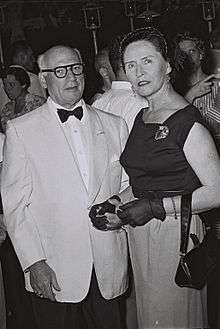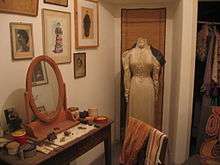Hanna Rovina
Hanna Rovina (Hebrew: חנה רובינא; 15 September 1888[1] – 3 February 1980), also Robina, was an Israeli actress. She is often referred to as the "First Lady of Hebrew Theatre".[2]
Hanna Rovina | |
|---|---|
 Hana Rovina in The Dybbuk (1920) | |
| Born | 15 September 1888 |
| Died | February 3, 1980 (aged 91) |
| Citizenship | Israeli |
| Occupation | Actress |
| Spouse(s) | Alexander Penn |
| Children | Ilana Rovina Sinilga Eisenschreiber Penn |

Biography
Hana Rovina was born in Byerazino, in the Igumensky Uyezd of the Minsk Governorate of the Russian Empire (present-day Belarus). She trained as a kindergarten teacher at a course for Hebrew-speaking kindergarten teachers in Warsaw (prior to the First World War).[3]
She had a daughter, Ilana, born in 1937, with the Hebrew poet Alexander Penn.[4] and after they married had another daughter, Sinilga Eisenschreiber Penn.[5]
Acting career
She began her acting career at the "Hebrew Stage Theatre" of Nahum Tzemach. She joined Habima theatre in 1917 just as it was being launched, and participated in its first production, a play by Yevgeny Vakhtangov. She became famous for her role as Leah'le, the young bride who is possessed by a demon in The Dybbuk by S. Ansky.[6]
In 1928, Rovina and the other actors of Habima immigrated to Mandate Palestine. Habima became the flagship of the new national theatre movement, and Rovina was recognized as the movement's leading actress.[7] The image of Rovina in her role as Leah in the Moscow performance of The Dybbuk, in a white dress, with her long black braid, became an icon of the emergent Hebrew theatre.[8][9]

Rovina took her acting very seriously and tried to live the life of the character, as prescribed by the Stanislavski School.
Nisim Aloni wrote a play, Aunt Liza, especially for her and Rovina played the lead.[10]
Rovina made high demands of her audience. She frequently stopped a play in the middle if she felt that the audience was not attentive enough. In one instance, she stopped the play Hannah Senesh in the middle of a scene and told the teenagers in the hall to stop eating sunflower seeds.
Awards and recognition
Rovina was awarded the Israel Prize for theatre in 1956.[8][11] She remained active on stage until her death, in 1980.[12] She died in Ra'anana, aged 91.
See also
- Theater of Israel
References
- On the dispute over her birth date, see: Carmit Guy, Ha-malka nas‘a be-otobus. Rovina ve-"Ha-Bima", Tel Aviv: Am Oved, 1995, p. 16.
- Pillar of fire: the rebirth of ... 27 August 2008. Retrieved 14 September 2011.
- Levy, Emanuel (1979). The Habima – Israel's National Theater, 1917–1977: A Study of Cultural Nationalism. New York: Columbia University Press. ISBN 0-231-04582-4. p. 6.
- Her Mother's Daughter, Haaretz
- Man of Many Parts
- Journeyman in Jerusalem: Memories ... Retrieved 14 September 2011.
- Kohansky, Mendel (2007). "Hanna Rovina." Encyclopaedia Judaica. 2nd ed. New York: Macmillan Reference USA. Retrieved via Biography in Context database, 2017-03-07. "Arriving with the company in Palestine in 1928, she was soon acknowledged as the country's leading actress and henceforth her career was identified with Habimah."
- Yerushalmi, Dorit (March 1, 2009). "Hanna Rovina". Jewish Women: A Comprehensive Historical Encyclopedia. Jewish Women's Archive. jwa.org. Retrieved 6 March 2017.
- Bullock, Ken (July 2, 2009). "Habimah Resurrects 'The Dybbuk'"". Berkeley Daily Planet. Retrieved 2017-03-06. "Indeed, the photograph of Rovina as Leah from the Moscow production became the icon of the Habimah—and of Jewish theater generally."
- Theater in Israel. 26 February 2008. Retrieved 14 September 2011.
- "Israel Prize Official Site - Recipients in 1956 (in Hebrew)".
- Who's who in Jewish history: after ... Retrieved 14 September 2011.